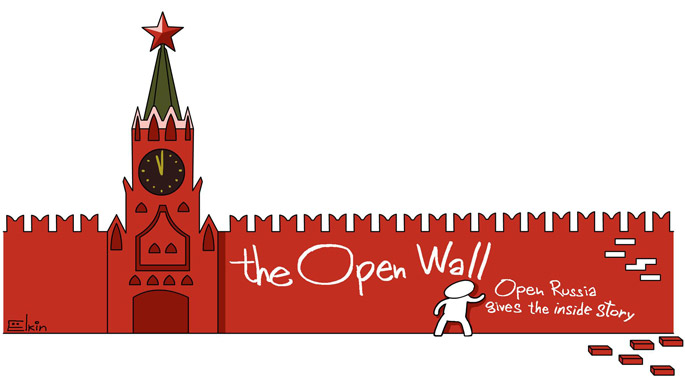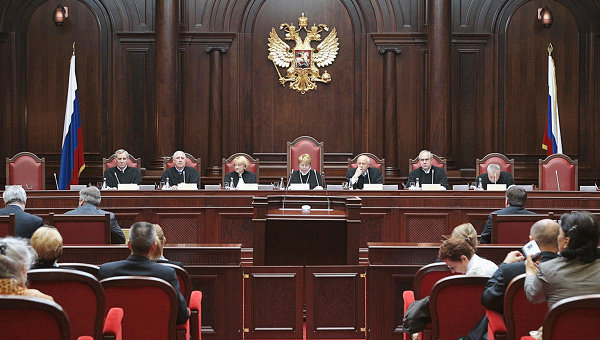Here sits the Constitutional Court R.I.P.

The Constitutional Court R.I.P.
An anniversary is being marked, quietly and inconspicuously, in Russia: it is twenty-five years since the creation of the Constitutional Court in 1991.

The Constitutional Court of Russia was set up on October 30, 1991. Which means that when the current chairman, Valery Zorkin, first assumed his post, the preamble to the Basic Law still featured passages about communism. When the new Constitution entered into force in 1993, Valery Zorkin, who frequently clashed with Boris Yeltsin, was chairman no longer. But a decade later, with Putin now in power, Mr Zorkin returned, and, having learned his lesson, rapidly transformed the Constitutional Court into an obedient instrument of the regime.
The realisation that the 1993 Constitution represented a blueprint for a super-presidential republic – whereby “the president is always right” – came to the Constitutional Court while Yeltsin was still in office. Thus, the Court decided in December 1998 that the President had the right to present the same candidate for the position of prime minister to Parliament three times, even though the Constitution made reference to candidatures (plural).
A year later, in December 1999, the Constitutional Court once again took the side of the president, adjudging that he (and not the Federation Council) wielded the authority to temporarily suspend the Prosecutor General from office (and we remind our readers that the out-of-favour Yuri Skuratov was duly framed in a sex scandal, with the incriminating tape finding its way to the media with help from then-FSB chief Vladimir Putin).
After Putin moved into the Kremlin, the Constitutional Court supported the President when, in the wake of the Beslan siege, he scrapped the direct election of governors. The judges argued that the new rules, whereby governors would be nominated by the president before being confirmed by regional legislatures, could not “be regarded as violating […] the principles of the separation of powers and federalism,” nor as violating “citizens’ constitutionally enshrined rights to vote, to participate in the running of state affairs, and to be elected to bodies of state governance.”
Back in 1996, it must be noted, the Court held a diametrically opposed viewpoint, insisting as it did that the Russian people should exercise their power directly, without the mediation of local parliaments: “The Legislative Assembly has been turned into a kind of electoral college, whose decisions replace the direct manifestation of the will of the electorate. This procedure does not conform to the Constitution and existing legislation. The head of the administration elected in accordance with such a procedure cannot be considered a legitimate and independent representative of the executive power.”
But the Constitutional Court really showed its true colours when it came to the Crimea question. On the night of March 18-19, 2014, an international treaty signed by the Crimean authorities and President Putin was hastily recognised by Constitutional Court judges as consistent with the Constitution of the Russian Federation. Constitutional law expert Elena Lukyanova, however, identified eight violations committed by the Court in the Kremlin’s name. Here, in her own words, is the first: “The Constitutional Court had no right to review the treaty. The law provides for a review of an international treaty only when such a treaty is subject to ratification and ‘the claimant believes that it cannot be enacted because it is unconstitutional.’ But there was no uncertainty regarding the constitutionality of the treaty. The President, who applied to the Constitutional Court, did not consider the treaty unconstitutional. Therefore, the request was not valid, and the Constitutional Court should not have taken it into consideration.”
In April 2014, the Court examined another headline case, this time concerning the constitutionality of the odious “foreign agent” law (which stipulates that any Russian NGO engaged in “political activity” and found to be receiving funds from abroad would be branded “foreign agents,” and subjected to interminable checks by the Ministry of Justice and the Prosecutor’s Office). Again, the Court addressed no more than the minutiae of the law (the fines payable by guilty NGOs were lowered, for example); as for its most punitive provisions, these were essentially kept intact, yet rendered even more vague – and therefore even more punitive – than they’d been previously. “This is one of the worst decisions in the Court’s history,” lamented law professor Ilya Shablinsky. “It demonstrates that the Court is […] almost completely subordinate to the executive.”
Erstwhile Constitutional Court judge and esteemed jurist Tamara Morshchakova believes that “the Russian judicial system is in ruins,” and that, when viewed against this desolate landscape, the fate of the Constitutional Court seems far from being an exception: “How could the Constitutional Court be independent if it’s headed by a lifetime chairman that the President can appoint as many times in a row as he likes, albeit for six years each time? And what happens to the independent position of a judge when they’ve expressed one dissenting opinion too many? They end up being forced to step down, that’s what. So that’s the way things are.”
Today, when lawyers in Russian courts make references to the Constitution, judges set about acting ostentatiously bored. Citing the Constitution has long been regarded as a weak strategy, resorted to only for lack of a better one. Russia’s Basic Law has effectively become the most inadequate and utterly non-functioning law of the country – a circumstance that has come to pass with the active complicity of the Constitutional Court. If the norms of the Criminal Code were as overwhelmingly disregarded as constitutional ones, the country would have long since descended into bloody violence.



